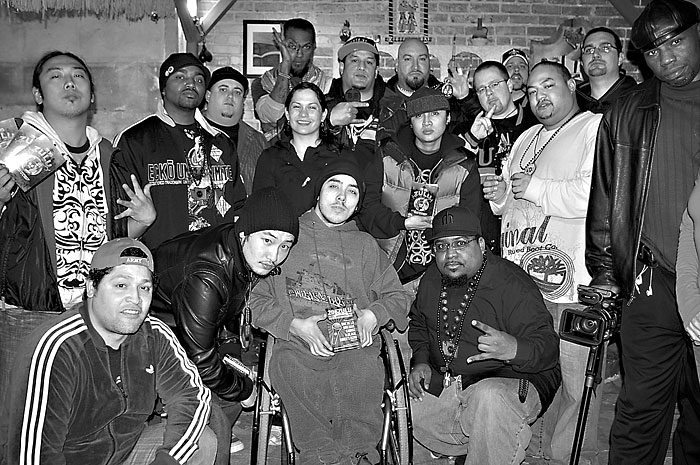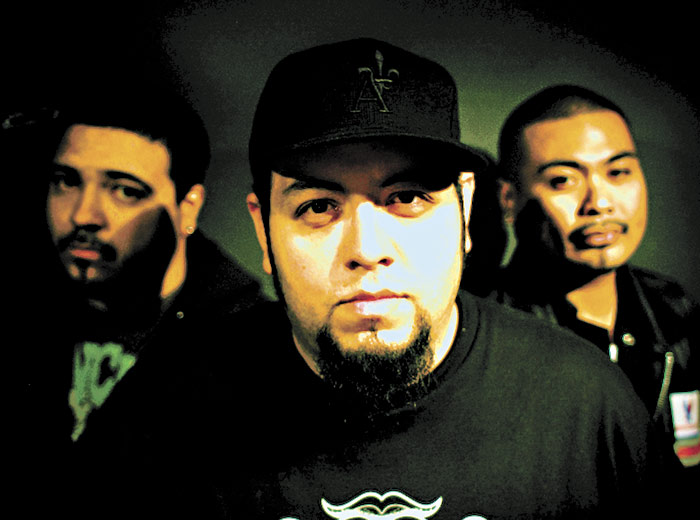Daniel Kogita doesn’t look like your average hip-hop impresario. To some, his lack of jewels and braggadocio could easily suggest that he’s not worth taking seriously in the world of rap. But what might not present itself at first glance is that the 30-year-old graffiti artist/producer/activist, who also goes by the name King Khazm, is the head of 206 Zulu, one of the Northwest’s most respected hip-hop organizations. They’re based in Beacon Hill and are the local chapter of the legendary Universal Zulu Nation, a grassroots hip-hop advocacy group first formed in the Bronx in 1974 by rap pioneer Afrika Bambaataa.
With 70-plus members, 206 Zulu is one of the most active and progressive chapters in the country (of roughly 15 to 20 nationwide). They’ve been at the forefront of using hip-hop as a vehicle for social change since 2004, when Kogita got Bambaataa’s blessing to establish a Zulu chapter in Seattle. They’ve since put on workshops in several Seattle public schools, community centers, and juvenile detention facilities—anyplace that will have them, really—based on what 206 Zulu sees as the five elements of hip-hop: DJing, MCing, break dancing, graffiti writing, and knowledge of the culture itself.
Those aspects were the foundation of hip-hop 30 years ago, and to the purists, that’s what keeps it strong. But as rap’s popularity continues to skyrocket, these core elements are often overlooked. 206 Zulu wants to change that.
“It’s real important to us to be visible in our communities and educate people on what hip-hop is all about,” Kogita says during a recent chat at his Beacon Hill residence. “Especially among the young people [in Seattle], because kids are dying on these streets right now.”
Fellow 206 Zulu member Kitty Wu, of the Internet television program Coolout TV, agrees. “We really want to reach kids of color that are having issues,” she says. “We feel like some of the issues going on with gangs in the city could be fixed if kids were getting reached earlier, and we think that hip-hop could make a difference.”
That’s why, on a Thursday night, a group of roughly 30 members (who run the gamut from DJs, b-boys, and rappers to diehard fans) are piled up inside Hidmo, an Eritrean restaurant and community center in the Central District, discussing Zulu’s fifth-anniversary party. Over Presidents’ Day weekend, numerous all-ages shows are scheduled, as well as DJ classes, graffiti expositions, a film festival, and world-class break-dancing competitions. They’re expecting upward of 2,000 attendees, many of whom will likely be teenagers and young adults.
“I’m hoping to see a lot of youth from the community come out for a bunch of free events and see all types of hip-hop elements that they might not typically be exposed to,” says 36-year-old Alonzo Ybarra, a teacher at Middle College High School and a member of 206 Zulu. “Kids are going to get a chance to see some of the best break dancers in the world battle in the true essence of the art form. If kids in Seattle can come out and get inspired by that, it would mean a lot.”
Jeff Clark is the principal at Seattle’s Denny Middle School, where 206 Zulu works with students biweekly. “From what I’ve seen, they’re really helping the kids develop their own voice through poetry and music,” Clark says. “We’ve worked with them for over a year, and I think they’ve done an excellent job of showing students the positive side of hip-hop.” Clark is also quick to mention that Zulu’s program of setting students’ poetry to music for a year-end compilation CD has helped with the school’s literacy efforts.
That’s good news to the founder of the Zulu Nation, who phoned from New York to express his support. “They’re one of the greatest chapters that we have right now,” Bambaataa says of 206 Zulu. “And I think it’s because they’re visible in the community spreading that fifth element—the knowledge. Anyone can deal with the other four elements, but [206 Zulu] has been strong with the knowledge part and keeping the culture alive.” He also praised Kogita for organizing one of the most active chapters on the West Coast.
Kogita, who sits in a wheelchair as a result of a childhood car accident, is revered by fellow group members, and inside Hidmo, they’re rapt by his every word. Considering hip-hop’s at-times egotistical nature, it says a lot about the group’s discipline that folks are willing to be led by an individual with a disability. 206 Zulu still has some gender issues as far as numbers go, but women play a big role in the organization.
“We may not always be the entertainers, but women are always going to be key within hip-hop community organizing,” says member Julie Chang-Schulman. “Within our group, that’s acknowledged.”
For those interested in learning more about the organization, this weekend’s events are the perfect place to begin. They’re not the only group pushing hip-hop forward in Seattle, but collectively, they’re currently the most visible.
“We’re all spread out in various cliques around the city,” Wu says about group members’ off hours. “But through 206 Zulu, we all come together we’re like the UN of hip-hop, the guardians of the culture.”






